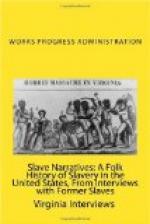While the wah was goin’ on, the soldiers were campin’ all about us and when they heer’d the Gray’s was comin’ they got ready for battle, and when they did come they fit’ em back, and they made their stand at Harpers Ferry, Va., and had a hard battle there. My mammy was scared of the Gray’s and when she heer’d they was comin’, would hide us three boys in some white folks cellar until they was gone. They would take all the young niggahs with them they could get hold of, and soon as they’d gone, we would go back home.
When the wah was over, me and some boys went over to the battlefield and foun’ a calvary gun which I had for years. We lived in a log cabin on a farm and worked for a farmer in the fields while my mammy worked in the house for the white folks. We had lots of things that is good and bad luck.”
Joana Owens:
The following is the life and traditions of Joana Owens, 520 E. Breckinridge St., Louisville, Kentucky, an old negro mammy who was born during slavery.
“My mother and father was slaves, and there was two children born to them, my sister and me. We used to live at Hawesville, Kentucky, on the Ohio River. My peoples name was Barr, and their masters name was Nolan Barr. You know they all had to take their masters name in slave days.
I will never forget how mean old Master Nolan Barr was to us. I was about fourteen years old and my sister was a little younger. We lived in an old log cabin. The cracks was filled with mud. My Mother done the housework for Master Barr’s house. My father and sister and me had to work in the fields. He had a big farm, and owned lots of slaves, and when the old master got mad at his slaves for not working hard enough he would tie them up by their thumbs and whip the male slaves till they begged for mercy. He sure was a mean old man. I will never forget him as long as I live. I don’t know exactly how old I is, but I am close to ninety now. After I growed up and married a man named Owens, we come here to Louisville to live. That was a short while after the slaves was freed. I can remember how me and my sister used to go down to the river and watch the red hospital boats come in, bringing the wounded soldiers in to be cared for, and me and sister would go long singing—Nigger—Nigger—never die, if you want a chicken pie.”
[Martha J. Jones:]
In an interview with Mrs. Martha J. Jones, she reminisced of the old Civil War days as follows:
“I was born in Buckingham County, Virginia, and later during the Civil War, I lived in Gilmer County, W. Va. My fathers name was Robert R. Turner; he was born in 1818 and my mother’s name was Susan; she was born in 1821. My parents had six children and we lived on a big farm.
My father was in the legislature in W. Va. During the Civil War, I had three brother in the Southern Army. One of them died of fever, one was shot and killed in action, and the other William Wert Turner, came out of the army after the close of the war and became a lawyer. Later he went to New Castle, Kentucky, and became a prominent lawyer, where he remained until his death in 1932.




